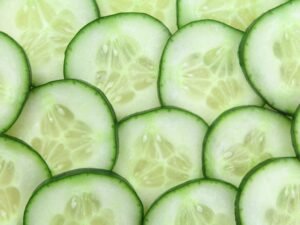Best Foods for Glowing Skin – According to Ayurveda
Did you know? The most efficient form of skincare is one that caters to both your internal and external needs.
Having flawless, radiant skin isn’t just a matter of all the facials and expensive products you put on every night; it is also about the nutrients you supply your body with daily. When we talk about eating right, we mean consuming the right nutrients in the right quantities to obtain overall health, under which skin health also becomes a priority.
Ayurveda also suggests that the secret to flawless skin is eating right for your mind-body type and including foods specifically known to impart a natural glow to your skin.
Foods to eat for glowing skin
Sometimes, more than all the external care you provide your skin, it is the treatment of the body internally that brings radiance to our skin. This could mean eating foods that cause a natural glow or consuming nutrient-rich foods that keep health conditions at bay that might dull your skin. Either way, the right food will fight allergies, repair cells, provide adequate nourishment, and prevent infections.
Ayurveda offers a list of therapies, foods, and treatments that can improve health, keep allergies at bay, and tend to other physical health needs.
Let’s take a look at some of Ayurveda’s most effective foods for glowing and radiant skin!
Cucumber
Cucumber is a water-based fruit known to keep you and your skin hydrated; it also helps keep the skin cool, moist, and firm. Cucumbers are known for their skin benefits since they can fight acne, even out your skin tone, prevent wrinkles and fine lines, protect the skin from harmful UV rays, heal scars, and repair damaged cells.
When it comes to consumption, you can eat cucumber as is, incorporate it into a salad or raita, or mix it with some yogurt. You could use the skin of the cucumber to make a face pack or massage slices of cucumber into your face for a cooling effect.

Neem leaves
The neem tree and neem leaves are one of the most popular herbs in Ayurveda. Although they are mainly known to treat and prevent certain diseases and conditions, neem leaves can also be highly effective in managing skin problems like rashes, acne, allergies, etc.
Neem leaves can be consumed orally or as an extract or essential oil. Its anti-bacterial and blood-purifying properties can help treat acne, dark spots, and scars.
Regarding neem leaves, care must be taken not to consume too many since it could cause harmful side effects.
Turmeric
Turmeric is one of the most popular spices in India and is known for its anti-bacterial, blood-purifying, anti-aging, and anti-fungal properties. Turmeric has been used as part of face packs and other skin treatments for decades due to its property to treat skin blemishes, acne, pigmentation, and inflammation. Turmeric is best suited to all skin types, Vata, Pitta, and Kapha.
Although applying turmeric directly on the face in the form of face packs is often what we read about, incorporating it into your food can also be equally effective. You can add this spice to your dishes or add a pinch of it to your homemade facial masks.
Saffron
Saffron is a commonly used spice in India. It is known for its fragrant smell, luxurious taste, and for its skin brightening properties. It is said to help fight skin blemishes like pigmentation, dark spots, etc. Saffron is best suited to Pitta and Kapha skin types.
To incorporate saffron into your diet or a face mask, you must first soak these strands in warm milk overnight, especially if you want to draw the most out of this spice. You can use these soaked strands to make a turmeric saffron face mask or add a strand or two to your dish while cooking.
Water
The most low-maintenance yet highly effective way to get flawless skin is by drinking sufficient water. Your skin is at its best when hydrated and pumped with adequate oxygen. Not drinking enough water could result in dry, dull-looking, rough skin.

Consuming around eight glasses daily is how much an individual would require to keep their body and skin hydrated. Drinking water can keep your skin clear, give it a supple glow, and help combat issues like eczema and psoriasis.
Final thoughts
When it comes to our health, various factors play an integral role, our gut being one o the most important ones. A healthy gut ensures overall healthy functioning of the body; sometimes, signs of an unhealthy gut start showing up on your skin as well.
All this is to say that nutrition and food play a more significant role in our life than we give them credit for and that everything in our body is interconnected. Therefore, the food we consume can directly or indirectly affect our skin health; eat right, and you will be left with a healthy-looking body and flawless, glowing skin!





